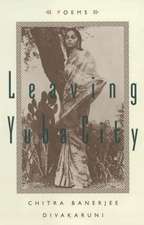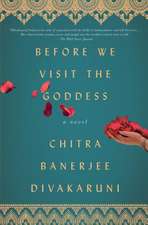The Mistress of Spices
Autor Chitra Banerjee Divakarunien Limba Engleză Paperback – 5 feb 1998
SHORTLISTED FOR THE WOMEN'S PRIZE FOR FICTION
'A dazzling tale... woven with poetry and storyteller magic.' AMY TAN
Tilo, an immigrant from India, runs a spice shop in Oakland, California. While she supplies the ingredients for curries and kormas, she also dispenses wisdom and the appropriate spice: for Tilo is a Mistress of Spices, a priestess of the secret magical powers of spices.
To those who visit her shop, Tilo prescribes coriander for the restoration of sight, chilli for the cleansing of evil, fenugreek for the pain of rejection. But when a lonely American ventures into the store, a troubled Tilo cannot find the correct spice, for he arouses in her a forbidden desire - which if she follows will destroy her magical powers.
Compelling and lyrical, full of heady scents and with more than a touch of humour, this novel explores the clash between East and West even as it unveils the universal mysteries of the human heart.
'I felt excited and empowered by the way she used words' NAOMI ALDERMAN, author of THE POWER
'Unusual, clever, and often exquisite' LA Times
_______________________________
| Toate formatele și edițiile | Preț | Express |
|---|---|---|
| Paperback (2) | 53.62 lei 24-30 zile | +19.88 lei 5-11 zile |
| Transworld Publishers Ltd – 5 feb 1998 | 53.62 lei 24-30 zile | +19.88 lei 5-11 zile |
| Anchor Books – 31 ian 1998 | 123.80 lei 3-5 săpt. |
Preț: 53.62 lei
Preț vechi: 63.70 lei
-16% Nou
Puncte Express: 80
Preț estimativ în valută:
10.26€ • 10.58$ • 8.66£
10.26€ • 10.58$ • 8.66£
Carte disponibilă
Livrare economică 13-19 februarie
Livrare express 25-31 ianuarie pentru 29.87 lei
Preluare comenzi: 021 569.72.76
Specificații
ISBN-13: 9780552996709
ISBN-10: 055299670X
Pagini: 317
Dimensiuni: 128 x 195 x 27 mm
Greutate: 0.24 kg
Editura: Transworld Publishers Ltd
Colecția Black Swan
Locul publicării:United Kingdom
ISBN-10: 055299670X
Pagini: 317
Dimensiuni: 128 x 195 x 27 mm
Greutate: 0.24 kg
Editura: Transworld Publishers Ltd
Colecția Black Swan
Locul publicării:United Kingdom
Descriere
To those customers who visit her Indian spice shop in Oakland, California, Tilo dispenses wisdom and the appropriate spice: coriander for sight, tumeric for wrinkles, and fenugreek to make a rejected wife desirable. However Tilo's powers are conditional - they vanish the moment she falls in love.
Notă biografică
Chitra Banerjee Divakaruni is the bestselling author of the novels Sister of My Heart and The Mistress of Spices; the story collections The Unknown Errors of Our Lives and Arranged Marriage, which received several awards, including the American Book Award; and four collections of prize-winning poetry. Her work has appeared in The New Yorker, The Atlantic Monthly, Ms., Zoetrope, Good Housekeeping, O: The Oprah Magazine, The Best American Short Stories 1999, and The New York Times. Born in India, Divakaruni lives near Houston.
For further information about Chitra Banerjee Divakaruni, visit her Web site at www.chitradivakaruni.com.
For further information about Chitra Banerjee Divakaruni, visit her Web site at www.chitradivakaruni.com.
Extras
I am a Mistress of Spices.
I can work the others too. Mineral, metal, earth and sand and stone. The gems with their cold clear light. The liquids that burn their hues into your eyes till you see nothing else. I learned them all on the island.
But the spices are my love.
I know their origins, and what their colors signify, and their smells. I can call each by the true-name it was given at the first, when earth split like skin and offered it up to the sky. Their heat runs in my blood. From amchur to zafran, they bow to my command. At a whisper they yield up to me their hidden properties, their magic powers.
Yes, they all hold magic, even the everyday American spices you toss unthinking into your cooking pot.
You doubt? Ah. You have forgotten the old secrets your mother's mothers knew. Here is one of them again: Vanilla beans soaked soft in goat's milk and rubbed on the wristbone can guard against the evil eye. And here another: A measure of pepper at the foot of the bed, shaped into a crescent, cures you of nightmare.
But the spices of true power are from my birthland, land of ardent poetry, aquamarine feathers. Sunset skies brilliant as blood.
They are the ones I work with.
If you stand in the center of this room and turn slowly around, you will be looking at every Indian spice that ever was--even the lost ones--gathered here upon the shelves of my store.
I think I do not exaggerate when I say there is no other place in the world quite like this. The store has been here only for a year. But already many look at it and think it was always.
I can understand why. Turn the crooked corner of Esperanza where the Oakland buses hiss to a stop and you'll see it. Perfect-fitted between the narrow barred door of Rosa's Weekly Hotel, still blackened from a year-ago fire, and Lee Ying's Sewing Machine and Vacuum Cleaner Repair, with the glass cracked between the R and the e. Grease-smudged window. Looped letters that say spice bazaar faded into a dried-mud brown. Inside, walls veined with cobwebs where hang discolored pictures of the gods, their sad shadow eyes. Metal bins with the shine long gone from them, heaped with atta and Basmati rice and masoor dal. Row upon row of videomovies, all the way back to the time of black-and-white. Bolts of fabric dyed in age-old colors, New Year yellow, harvest green, bride's luck red.
And in the corners accumulated among dustballs, exhaled by those who have entered here, the desires. Of all things in my store, they are the most ancient. For even here in this new land America, this city which prides itself on being no older than a heartbeat, it is the same things we want, again and again.
I too am a reason why. I too look like I have been here forever. This is what the customers see as they enter, ducking under plastic-green mango leaves strung over the door for luck: a bent woman with skin the color of old sand, behind a glass counter that holds mithai, sweets out of their childhoods. Out of their mothers' kitchens. Emerald-green burfis, rasogollahs white as dawn and, made from lentil flour, laddus like nuggets of gold. It seems right that I should have been here always, that I should understand without words their longing for the ways they chose to leave behind when they chose America. Their shame for that longing, like the bitter-slight aftertaste in the mouth when one has chewed amlaki to freshen the breath.
They do not know, of course. That I am not old, that this seeming-body I took on in Shampati's fire when I vowed to become a Mistress is not mine. I claim its creases and gnarls no more than water claims the ripples that wrinkle it. They do not see, under the hooded lids, the eyes which shine for a moment--I need no forbidden mirror (for mirrors are forbidden to Mistresses) to tell me this--like dark fire. The eyes which alone are my own.
No. One more thing is mine. My name which is Tilo, short for Tilottama, for I am named after the sun-burnished sesame seed, spice of nourishment. They do not know this, my customers, nor that earlier I had other names.
Sometimes it fills me with a heaviness, lake of black ice, when I think that across the entire length of this land not one person knows who I am.
Then I tell myself, No matter. It is better this way.
"Remember," said the Old One, the First Mother, when she trained us on the island. "You are not important. No Mistress is. What is important is the store. And the spices."
The store. Even for those who know nothing of the inner room with its sacred, secret shelves, the store is an excursion into the land of might-have-been. A self-indulgence dangerous for a brown people who come from elsewhere, to whom real Americans might say Why?
Ah, the pull of that danger.
They love me because they sense I understand this. They hate me a little for it too.
And then, the questions I ask. To the plump woman dressed in polyester pants and a Safeway tunic, her hair coiled in a tight bun as she bends over a small hill of green chilies searching earnestly: "Has your husband found another job since the layoff."
To the young woman who hurries in with a baby on her hip to pick up some dhania jeera powder: "The bleeding, is it bad still, do you want something for it."
I can see the electric jolt of it go through each one's body, the same every time. Almost I would laugh if the pity of it did not tug at me so. Each face startling up as though I had put my hands on the delicate oval of jaw and cheekbone and turned it toward me. Though of course I did not. It is not allowed for Mistresses to touch those who come to us. To upset the delicate axis of giving and receiving on which our lives are held precarious.
For a moment I hold their glance, and the air around us grows still and heavy. A few chilies drop to the floor, scattering like hard green rain. The child twists in her mother's tightened grip, whimpering.
Their glance skittery with fear with wanting.
Witchwoman, say the eyes. Under their lowered lids they remember the stories whispered around night fires in their home villages.
"That's all for today," one woman tells me, wiping her hands on nubby polyester thighs, sliding a package of chilies at me.
"Shhh baby little rani," croons the other, busies herself with the child's tangled curls until I have rung up her purchases.
They keep their cautious faces turned away as they leave.
But they will come back later. After darkness. They will knock on the shut door of the store that smells of their desires and ask.
I will take them into the inner room, the one with no windows, where I keep the purest spices, the ones I gathered on the island for times of special need. I will light the candle I keep ready and search the soot-streaked dimness for lotus root and powdered methi, paste of fennel and sun-roasted asafetida. I will chant. I will administer. I will pray to remove sadness and suffering as the Old One taught. I will deliver warning.
This is why I left the island where each day still is melted sugar and cinnamon, and birds with diamond throats sing, and silence when it falls is light as mountain mist.
Left it for this store, where I have brought together everything you need in order to be happy.
I can work the others too. Mineral, metal, earth and sand and stone. The gems with their cold clear light. The liquids that burn their hues into your eyes till you see nothing else. I learned them all on the island.
But the spices are my love.
I know their origins, and what their colors signify, and their smells. I can call each by the true-name it was given at the first, when earth split like skin and offered it up to the sky. Their heat runs in my blood. From amchur to zafran, they bow to my command. At a whisper they yield up to me their hidden properties, their magic powers.
Yes, they all hold magic, even the everyday American spices you toss unthinking into your cooking pot.
You doubt? Ah. You have forgotten the old secrets your mother's mothers knew. Here is one of them again: Vanilla beans soaked soft in goat's milk and rubbed on the wristbone can guard against the evil eye. And here another: A measure of pepper at the foot of the bed, shaped into a crescent, cures you of nightmare.
But the spices of true power are from my birthland, land of ardent poetry, aquamarine feathers. Sunset skies brilliant as blood.
They are the ones I work with.
If you stand in the center of this room and turn slowly around, you will be looking at every Indian spice that ever was--even the lost ones--gathered here upon the shelves of my store.
I think I do not exaggerate when I say there is no other place in the world quite like this. The store has been here only for a year. But already many look at it and think it was always.
I can understand why. Turn the crooked corner of Esperanza where the Oakland buses hiss to a stop and you'll see it. Perfect-fitted between the narrow barred door of Rosa's Weekly Hotel, still blackened from a year-ago fire, and Lee Ying's Sewing Machine and Vacuum Cleaner Repair, with the glass cracked between the R and the e. Grease-smudged window. Looped letters that say spice bazaar faded into a dried-mud brown. Inside, walls veined with cobwebs where hang discolored pictures of the gods, their sad shadow eyes. Metal bins with the shine long gone from them, heaped with atta and Basmati rice and masoor dal. Row upon row of videomovies, all the way back to the time of black-and-white. Bolts of fabric dyed in age-old colors, New Year yellow, harvest green, bride's luck red.
And in the corners accumulated among dustballs, exhaled by those who have entered here, the desires. Of all things in my store, they are the most ancient. For even here in this new land America, this city which prides itself on being no older than a heartbeat, it is the same things we want, again and again.
I too am a reason why. I too look like I have been here forever. This is what the customers see as they enter, ducking under plastic-green mango leaves strung over the door for luck: a bent woman with skin the color of old sand, behind a glass counter that holds mithai, sweets out of their childhoods. Out of their mothers' kitchens. Emerald-green burfis, rasogollahs white as dawn and, made from lentil flour, laddus like nuggets of gold. It seems right that I should have been here always, that I should understand without words their longing for the ways they chose to leave behind when they chose America. Their shame for that longing, like the bitter-slight aftertaste in the mouth when one has chewed amlaki to freshen the breath.
They do not know, of course. That I am not old, that this seeming-body I took on in Shampati's fire when I vowed to become a Mistress is not mine. I claim its creases and gnarls no more than water claims the ripples that wrinkle it. They do not see, under the hooded lids, the eyes which shine for a moment--I need no forbidden mirror (for mirrors are forbidden to Mistresses) to tell me this--like dark fire. The eyes which alone are my own.
No. One more thing is mine. My name which is Tilo, short for Tilottama, for I am named after the sun-burnished sesame seed, spice of nourishment. They do not know this, my customers, nor that earlier I had other names.
Sometimes it fills me with a heaviness, lake of black ice, when I think that across the entire length of this land not one person knows who I am.
Then I tell myself, No matter. It is better this way.
"Remember," said the Old One, the First Mother, when she trained us on the island. "You are not important. No Mistress is. What is important is the store. And the spices."
The store. Even for those who know nothing of the inner room with its sacred, secret shelves, the store is an excursion into the land of might-have-been. A self-indulgence dangerous for a brown people who come from elsewhere, to whom real Americans might say Why?
Ah, the pull of that danger.
They love me because they sense I understand this. They hate me a little for it too.
And then, the questions I ask. To the plump woman dressed in polyester pants and a Safeway tunic, her hair coiled in a tight bun as she bends over a small hill of green chilies searching earnestly: "Has your husband found another job since the layoff."
To the young woman who hurries in with a baby on her hip to pick up some dhania jeera powder: "The bleeding, is it bad still, do you want something for it."
I can see the electric jolt of it go through each one's body, the same every time. Almost I would laugh if the pity of it did not tug at me so. Each face startling up as though I had put my hands on the delicate oval of jaw and cheekbone and turned it toward me. Though of course I did not. It is not allowed for Mistresses to touch those who come to us. To upset the delicate axis of giving and receiving on which our lives are held precarious.
For a moment I hold their glance, and the air around us grows still and heavy. A few chilies drop to the floor, scattering like hard green rain. The child twists in her mother's tightened grip, whimpering.
Their glance skittery with fear with wanting.
Witchwoman, say the eyes. Under their lowered lids they remember the stories whispered around night fires in their home villages.
"That's all for today," one woman tells me, wiping her hands on nubby polyester thighs, sliding a package of chilies at me.
"Shhh baby little rani," croons the other, busies herself with the child's tangled curls until I have rung up her purchases.
They keep their cautious faces turned away as they leave.
But they will come back later. After darkness. They will knock on the shut door of the store that smells of their desires and ask.
I will take them into the inner room, the one with no windows, where I keep the purest spices, the ones I gathered on the island for times of special need. I will light the candle I keep ready and search the soot-streaked dimness for lotus root and powdered methi, paste of fennel and sun-roasted asafetida. I will chant. I will administer. I will pray to remove sadness and suffering as the Old One taught. I will deliver warning.
This is why I left the island where each day still is melted sugar and cinnamon, and birds with diamond throats sing, and silence when it falls is light as mountain mist.
Left it for this store, where I have brought together everything you need in order to be happy.
Recenzii
"An unusual, clever, and often exquisite first novel...The result is rather as if Isabel Allende met Laura Esquivel."
--Los Angeles Times
"Divakaruni's prose is so pungent that it stains the page, yet beneath the sighs and smells of this brand of magic realism she deftly introduces her true theme: how an ability to accommodate desire enlivens not only the individual heart but a society cornered by change."
--The New Yorker
"The Mistress of Spices is a dazzling tale of misbegotten dreams and desires, hopes and expectations, woven with poetry and storyteller magic."
--Amy Tan
"A splendid novel, beautifully conceived and crafted."
--Pat Conroy
--Los Angeles Times
"Divakaruni's prose is so pungent that it stains the page, yet beneath the sighs and smells of this brand of magic realism she deftly introduces her true theme: how an ability to accommodate desire enlivens not only the individual heart but a society cornered by change."
--The New Yorker
"The Mistress of Spices is a dazzling tale of misbegotten dreams and desires, hopes and expectations, woven with poetry and storyteller magic."
--Amy Tan
"A splendid novel, beautifully conceived and crafted."
--Pat Conroy












